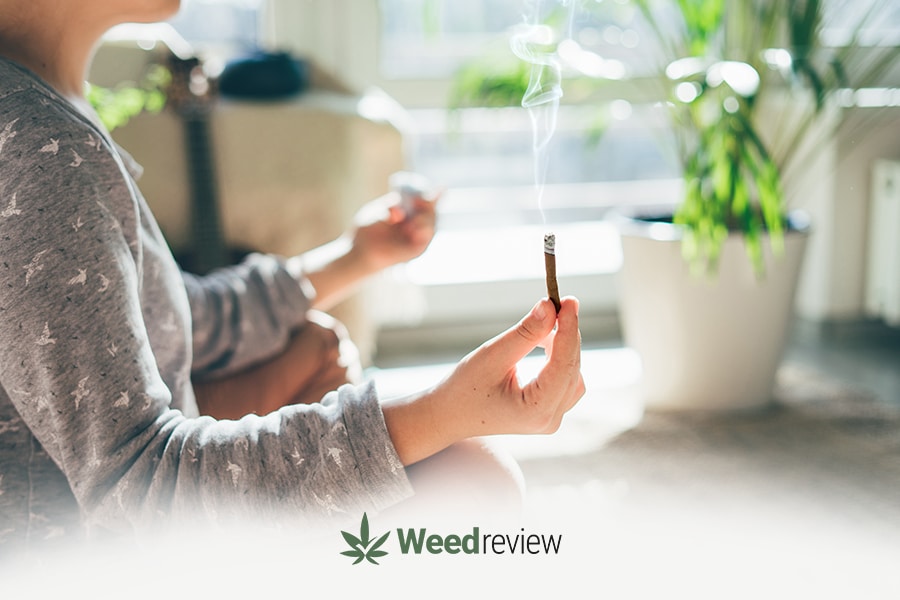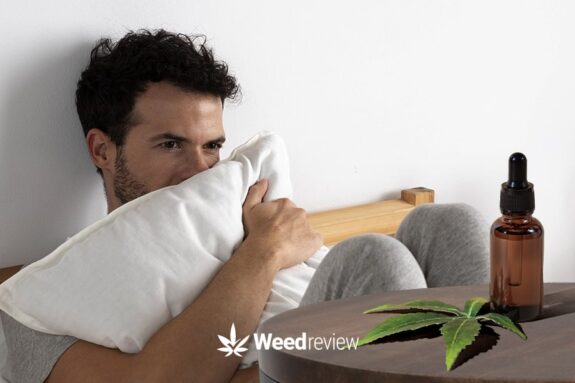
CBD for Anxiety: Research, Products, Dosage, and Safety

Table of Contents
Welcome to our guide on understanding the impact of CBD on anxiety.
In this article, we will explore the research behind cannabidiol and how it affects anxiety. We will also look at the products available, recommended dosages, and safety considerations.
Whether you’re new to CBD or seeking to enhance your knowledge, we will break down complex ideas into easy-to-understand language so you can make informed choices for a calmer, more relaxed life.
What is CBD?
CBD, short for cannabidiol, is a natural compound found in the cannabis plant. It’s one of over a hundred cannabinoids, but unlike its well-known cousin, THC (tetrahydrocannabinol), CBD doesn’t produce a “high” effect.
Researchers are continually studying CBD’s potential therapeutic properties, and it is becoming popular as a versatile natural remedy. CBD offers potential health benefits like improving sleep, reducing pain, and anxiety relief without the psychoactive side effects.
Visit our dedicated page for a comprehensive overview of the specifics of cannabidiol.
Cannabidiol and anxiety: What does the research say?
In recent years, the scientific community has shown a growing interest in the potential of cannabidiol to treat anxiety. Similar to pain and sleep, the world of anxiety disorders has seen plenty of research on its interaction with the endocannabinoid system.
Let’s look at some of the most notable research trends evaluating CBD’s anxiolytic properties:
- In a 2015 review titled ‘Cannabidiol as a Potential Treatment for Anxiety Disorders’ by Esther M. Blessing et al. published in Neurotherapeutics, it was noted that CBD has strong potential in the treatment of anxiety disorders, including PTSD (post-traumatic stress disorder), GAD (generalized anxiety disorder), and SAD (social anxiety disorder).
- A study was conducted in 2019 that looked at whether CBD can help improve sleep and/or anxiety in a clinical population. The findings revealed that 79.2% of the final participants experienced a significant reduction in anxiety during the first month of the study, and this reduction in anxiety persisted throughout the duration of the study.
- Similarly, a 2020 review published in the Biomolecules Journal further validated the anxiolytic properties of CBD, stating that ‘CBD may be a potential therapy for treating anxiety, depression, schizophrenia, and related psychotic disorders.’
- A more recent study published in 2022 in the Journal of Clinical Psychiatry echoed similar results. The study looked at the effectiveness and safety of CBD in young people with treatment-resistant anxiety disorders. The findings suggested that cannabidiol can reduce anxiety severity in people who previously did not respond to standard treatments.
- Similar findings can also be seen across other types of anxiety disorders like SAD. Research suggests that CBD can be a promising treatment for social anxiety disorder, thus warranting more studies.
It should be noted that across all of these studies, CBD was generally well-tolerated with little to no serious side effects.
While these findings seem promising, we need to remember a couple of things. First, some of these studies had only a small number of people participating, and this means the results might not apply to everyone. Second, these studies didn’t check what happens when people take CBD for anxiety over a long time. So, we’re not sure if it always helps reduce anxiety when used regularly.
So does that mean CBD helps with anxiety? Yes, it does. If you want to use CBD to reduce your anxiety, start low, go slow, and keep your doctor informed.
What are the different CBD products available in the market?

CBD products come in various forms, each offering unique features. Here’s a look at some popular options:
CBD oils
- CBD oils & tinctures are highly versatile, easy to use, and often recommended for anxiety. They come in various concentrations and spectrums (broad, full, and isolate), allowing you to customise your dosage. They are taken sublingually (under the tongue) for faster absorption.
- Onset time for CBD oil can vary but typically ranges from 15 minutes to an hour.
- The effects of the oil can last anywhere from 4 to 6 hours, depending on factors like dosage and metabolism.
CBD gummies
- Cannabidiol gummies are a discreet and tasty way to take CBD. They come in a wide variety of flavours and dosages, making them appealing to a broad range of users.
- Gummies take longer than oils to kick in, ranging from 30 minutes to 2 hours, as they need to be digested before entering the bloodstream.
- The effects of CBD edibles can last longer than other methods, often up to 6 to 8 hours, due to the gradual release of CBD during digestion.
CBD flowers
- CBD flowers, also known as hemp buds, are CBD’s natural, unprocessed form. They contain many cannabinoids and terpenes, offering a full-spectrum experience. They can be smoked or vaporised.
- Smoking or vaporising CBD flowers provides a rapid onset, usually within minutes, making it one of the quickest methods.
- The effects of smoking or vaporizing CBD flowers typically last around 2 to 3 hours.
Weed Review recommends buying CBD products from licensed dispensaries. Opt for reputed brands and choose quality products for the best results.
Are these CBD items legal?
CBD products are legal in Thailand as per the existing cannabis laws. You can buy CBD products at stores without needing a prescription. But if you have a specific anxiety condition, you can also visit a doctor who can prescribe the right CBD product for you.
Is it a good idea to take CBD with THC?
THC is known to make people anxious in high doses. In low doses, however, THC can reduce anxiety. If you are someone who suffers from chronic anxiety, taking potent THC products may not be a good idea as it can worsen your symptoms.
Instead, you can opt for a full-spectrum CBD oil, which contains approximately 0.2% THC. This offers the benefits of a full-spectrum experience without the psychoactive high or increased anxiety.
CBD dosage for anxiety: How many mg of cannabidiol should you take?
A CBD dose of 25-75 mg per day may be taken for general anxiety disorders. In severe cases, the dosage may be upped to 300 – 600 mg per day. In either case, these dosages are best taken under the supervision of a doctor.
There are no universal guidelines on how much CBD you can take to ease your anxiety. It varies for each person and depends on factors like weight, metabolism, and condition. For instance, a larger, heavier person will need more CBD compared to someone with a smaller stature.
It should be noted doses as high as 1,500 mg per day have been observed to be well-tolerated.
The best course of action is to:
- Start with a low dose, usually around 10-20 milligrams (mg), and see how your body responds.
- Gradually increase the dose if you don’t feel the effects, but do not increase it too sharply.
- Be mindful of drug interactions.
- Consult your healthcare practitioner or a medical cannabis specialist.
Are there any side effects to taking CBD?
Using CBD for anxiety is generally considered safe, but like any substance, it can have side effects. Here are a few things to keep in mind:
- Dry mouth: Some people may experience a dry sensation in their mouth after taking CBD. Drinking water or staying hydrated can help ease this.
- Drowsiness: CBD may cause drowsiness in some people, especially when taken in higher doses. Do not drive or operate heavy machinery if you feel drowsy.
- Changes in appetite: CBD can affect your appetite, sometimes increasing it and, in some cases, reducing it. Pay attention to how your body responds.
- Diarrhoea: In rare cases, CBD may lead to gastrointestinal issues like diarrhoea. If this happens, consider reducing your dosage.
Can you take cannabidiol with anti-anxiety medications?
It is not recommended that you mix CBD with prescription medicines. CBD can interact with certain medications, which may impact their effectiveness or result in unexpected side effects.
- Combining CBD with specific anti-anxiety medications, such as benzodiazepines (e.g., Xanax, Valium, Ativan), can potentially lead to heightened sedation and drowsiness.
- CBD interactions with blood pressure medications, including beta-blockers and calcium channel blockers, can lead to fluctuations in blood pressure levels.
- While research on this topic is ongoing, there is concern that combining CBD with SSRIs (e.g., Prozac, Zoloft) or SNRIs (e.g., Savella, Fetzima) may increase the risk of serotonin syndrome, a potentially serious condition characterized by symptoms like agitation, high heart rate, and confusion.
Please consult a doctor if you are taking medicines regularly and want to add CBD to the routine. They can make adjustments to your treatment for the best results.
Conclusion
CBD stands as a promising remedy in the world of anxiety management. Research continues to show plenty of potential in cannabidiol’s ability to ease our anxiety and stress. However, you must be careful in using it – starting with a low dose, consulting your doctor, and being mindful of potential interactions.
For a deeper dive into the CBD, medical cannabis and their diverse offerings, we encourage you to explore Weed Review. You will learn about the different legal products, the science that backs their benefits, and how to use these to improve your wellness journey.


